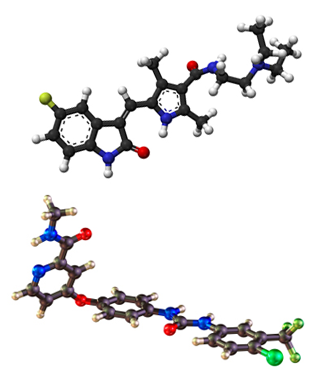Sorafenib, Sunitinib Sequences Yield Similar Results in RCC
The order of the sequencing of sorafenib and sunitinib for first-line and second-line therapy did not affect progression-free and overall survival for patients with advanced renal cell carcinoma.
Ball-and-stick models of sunitinib (top) and sorafenib (bottom)

The order of the sequencing of sorafenib and sunitinib for first-line and second-line therapy did not affect progression-free and overall survival for patients with advanced renal cell carcinoma, according to the results of the SWITCH trial.
Maurice Stephan Michel, MD, PhD, of the University Medical Center Mannheim, Germany, presented the results of the trial at the 2014 ASCO Genitourinary Cancers Symposium.
Both sorafenib and sunitinib are approved for the treatment of advanced renal cell cancer. Previously conducted retrospective studies have compared the sequential use of sorafenib followed by sunitinib and sunitinib followed by sorafenib.
The SWITCH trial was a phase III, prospective study comparing the sequencing of the two treatments in 365 patients with advanced or metastatic renal cell carcinoma. Patients were randomly assigned to sorafenib 400 mg (n = 182) or sunitinib 50 mg (n = 183) and upon progression or intolerable toxicity were switched to the opposite treatment. The primary endpoint was total progression-free survival defined as the time from randomization to confirmed progression or death during second-line therapy.
No statistically significant difference in total progression-free survival was found between the two treatment arms. Patients assigned sorafenib first had a median progression-free survival of 12.5 months compared with 14.9 months for patients assigned sunitinib first.
Additionally, no significant difference was found between the two arms for overall survival (31.5 months for sorafenib first vs 30.2 months for sunitinib first). However, Michel did point out that the approximate 30-month overall survival was among the longest yet reported for patients with metastatic renal cell carcinoma.
The researchers also looked at the data for progression-free survival after first-line and second-line treatment. Although no significant difference was found between the arms for first-line progression-free survival, patients assigned to sunitinib first had a significantly worse second-line progression-free survival (2.4 months) compared with patients who received sorafenib (5.4 months; P < .001).
“This must be taken with caution because we had some limitations due to the imbalance between the two arms for patients initiating protocol-defined second-line therapy,” Michel said. Only 76 patients who started on sunitinib crossed over to receive sorafenib compared with 103 patients who crossed over to receive sunitinib.
Patients assigned to sorafenib first had significantly higher diarrhea and hand-foot skin reaction compared with patients assigned sunitinib first. In contrast, patients assigned sunitinib first had significantly more nausea and stomatitis. The overall adverse events profile was as expected.